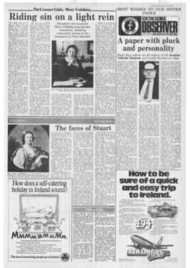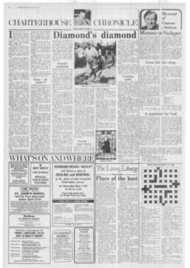Page 1, 19th April 1985
Page 1

Report an error
Noticed an error on this page?If you've noticed an error in this article please click here to report it.
Tags
Share
Related articles
Letter From Rome
Ope Of The Space-age
An Extraordinary Gift For Calm And Quiet In The Midst Of...
A Solemn Office Becomes A Grassroots Mission
President Nixon's Man At The Vatican
Molotov cocktails thrown after fascist audience
Italian election controversy engulfs Pope
by Peter Stanford AS ITALY is gripped by election fever, Pope John Paul has been drawn into the campaign debate by national newspapers and politicians who have interpreted his remarks to the Assembly of the Italian Church as an invitation to voters to support the Christian Democrat party.
During an hour long address which placed great stress on the need for unity in the Italian church, the Pope remarked that in critical moments Italian Catholics have always been united for the supreme good of the nation. He reminded delegates that Italian history was in many ways "the history of church efforts and social initiatives that have formed a base for Christian action in the political field".
Seizing on this short comment from a lengthy address the daily newspaper Reporter summarised the Pope's text with the headline "And the Pope says `vote DC"', a reference to the Christian Democrat's acronym.
The controversy over the Pope's supposed intervention in domestic politics comes in advance of the eagerly anticipated May 12 regional and local elections, and after the Italian bishops conference had made controversial comments warning that not all Italy's political parties were compatible with Christian principles. The Communist Party took this as an attack on its position.
Public debate about the Pope's political comments was fuelled by his alleged remarks to far-right parliamentarians at last Wednesday's public audience. According to the parliamentarians themselves the Pope encouraged them to continue combatting abortion and the "decadence" of Europe. A Vatican spokesman has denied that the Pope made any such comment.
In Rome for a meeting organised by the neo-Fascist MSI party, the delegates, including the French National Front leader, Jean-Marie Le Pen, were in the front row at the audience when the Pope came down and moved among them. Later M Le Pen, who has recently been severely criticised by the French bishops for his openly racist stance, told reporters that the Pope had told him "you're right. It is necessary to fight Europe's decadence with the greatest energy".
The MS1 are one of the parties running in next month's elections, and are campaigning for the restoration of the death penalty.
On the day following the papal audience, two Molotov cocktails were thrown at the twin churches of San Carlo and Sant' Agostino which face out onto the Piazza del Popoio at the north end of the Corso. An anonymous telephone caller to the Rome daily Messaggero later claimed that the bombs, which caused no casualities but extensive damage, were the work of an anti-Fascist league. He criticised the Pope for talking to the MSI leader Giorgio Almirante.
Cardinal Anastasio Ballestrero, Archbishop of Turin and President of the Italian bishops' conference,
rejected completely the press interpretations of the Pope's remarks to the Church Assembly at Loreto. In a joint declaration with Cardinal Carlo Martini, Archbishop of Milan, he insisted that the point of the assembly, which had been four years in preparation, was to stress the need for all elements in the church — priests, bishops and laity — to live at peace with each other and society.
The Loreto assembly, the first for ten years, was marked by tensions between traditional groups such as Catholic Action and more radical movements such as Cornmunione e Liberation as to how the church should approach secular society. In his address the Pope told delegates that they must not be afraid of taking up a public role. "Christians would be failing in their task if they did not work to make social structures respectful of ethical values".
In a statement to the press about the controversy which surrounded the Pope's remarks, Ciriaco De Mita, Secretary of the Christian Democrats who are members of Bettino Craxi's coalition government, appealed to Catholics to make abortion an issue in the election. They should work to revise the present liberal law which virtually allows abortion on demand.
There has been a heated debate about the role of the church in politics in the run-up to the May election. The Communists attacked the bishops for their statement regarding Christian values in politics, and will campaign on a manifesto which promises liberalised abortion and divorce laws. THE desirability of national guidelines on the minimum age for confirmation was on the agenda at the Low Week meeting of the Catholic bishops of England and Wales which ended yesterday.
'1 he bishops would consider the sacrament in "broader terms than simply trying to pinpoint a certain age", Mgr Vincent Nichols, General Secretary of the conference said on Monday. Methods of preparation for confirmation at school and at home would he raised as would opinions on the theological meaning of the sacrament.
A variety of views is known to exist on the matter in the bishops' conference. The general attitude favours the idea of confirming young people as late as possible, in order to allow them to make an Informed commitment to the faith, but there are notable dissentions. Archhishop Maurice Couve de Murville of Birmingham recently recommended in a pastoral letter that children should he confirmed between ten and 12
years.
Other matters to be discussed at the Low Week meeting would include a programme of preparation for the extraordinary synod which the Pope has culled for November 25 to December 8, and for the Synod on the Laity which was this week officially postponed until 1987 instead of 1986. The bishops hoped to extend consultations of Catholics in this country as widely as possible, Mgr Nichols said.
The final form of the bishops response to the first Anglican Roman Catholic International Commission (ARCIC D would be debated al the meeting, Mgr Nichols went on. The reply, which was examined at the bishops study week in January, is expected to be approved and forwarded to Rome for consideration.
Another ecumenical matter on the agenda is the programme of study, discussions and prayer between the churches in this country. The bishops have already agreed to the matter in principle but now need to iron
photo Cathy Corcoran out details. Other questions such as the continuing debate on in vitro fertilisation and the first report of the Committee for nuclear issues, plus reports by Bishop Joseph Hitchin on his recent visit to Ethiopia to watch famine relief and by Bishop David Konstant who went to South Africa to attend the trial of Archbishop Denis Hurley, will also be raised.
In his report on his trip to Ethiopia, Bishop Hitchin, Chairman of Cafod, highlights the fact that now nine million people are severely affected by the drought. He identifies the main problems now facing relief workers in the country as the inadequate supply of vehicles for transport, the civil war in Tigre and Eritrea provinces, a shortage of seeds for planting, and the question of the Ethiopian government's policy of resettling refugees from the north in the more fertile south and west. He recommends that the present level of relief aid should continue and that commitment to longer-term development must he renewed.
blog comments powered by Disqus











